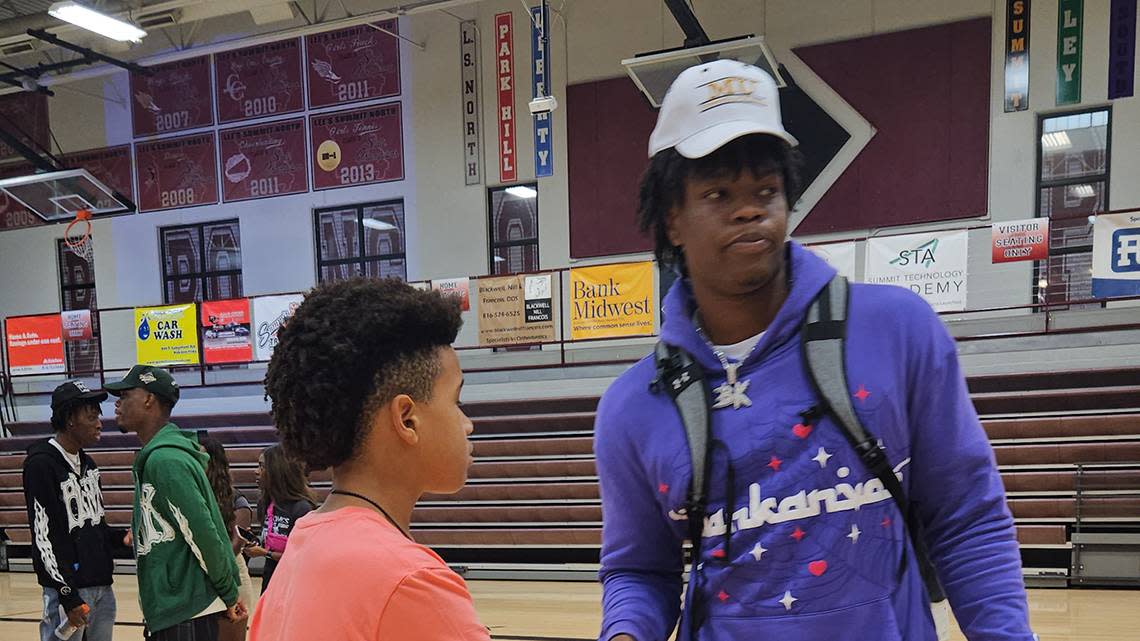NIL a game-changer for athletes like Lee’s Summit football star. Why not pay the kids? | Opinion

- Oops!Something went wrong.Please try again later.
Minutes after Williams Nwaneri committed to play college football at the University of Missouri, I pulled the young fella aside. At 17, I wanted to know if he had grown accustomed to the pomp and pageantry associated with being the nation’s No. 1 2024 recruit, according to high school and college sports website On3.com.
Williams is keeping everything in the proper perspective. He is legally still a minor, so I will refer to him by his first name in this column.
“Really just trying … to stay humble and not let it get to my head or anything like that,” he said. “Just trying to stay focused through it all.”
Williams is a senior football player at Lee’s Summit North High School. At 6 feet, 6 inches tall and a solid 265 pounds, he’s not your ordinary teen, though. He plays a premium position in football — defensive end — and On3.com values his name, image and likeness worth at $386,000. It increased $22,000 after his commitment.
Williams’ composite evaluation from that site, Rivals.com and 247Sports.com lists him among the top three players in the country. Wow.
ESPN rates him as the No. 12 high school football player in the nation.
Weeks ago, Williams made history as the Kansas City metropolitan area’s first No. 1-ranked high school football player in the country. With the ranking came an immediate boost to the player’s earning potential.
In the new era of name, image and likeness earning potential in college sports, can you say ching ching? The young man is poised to cash in on his immense talent before he ever steps foot on a college campus.
And you know what? I can’t fault Williams or any other top college recruit for knowing their worth. College sports is a billion-dollar industry. In 2019, Division I athletics generated $15.8 billion in revenue, according to the NCAA, the regulatory body for college sports.
Over time, purists won’t like these changes, some argue. I’m not among them. Young people who have earned the right to be compensated for their athletic skill should be paid.
A student-athlete’s worth
Until recently, college athletes were left on the outside looking in, fending for themselves, an omission that has never sat right with me.
I played college football in the 1990s at the University of Central Missouri in Warrensburg. Extra benefits not covered by my scholarship were not allowed by the NCAA. My teammates and I lacked the ability to make money for our exploits on the gridiron. Nor could we work during the season.
I wasn’t a good enough player to command a $5 cheeseburger from the local pub. But still, I would have loved to have been paid to play the game at the college level.
My scholarship covered room, board, tuition, books and meals. Back then, UCM’s dining services offered only brunch on Sundays, not dinner. Once, an assistant coach I will not name purchased a large pizza for me and three of my teammates to share on a late fall Sunday evening.
Everyone involved knew the buy was a breach of NCAA rules. But as a coach, you can’t recruit kids to play at your school and allow them to go without basic needs.
Thankfully, Williams and other future and current Tigers won’t have problems securing meals.
Coach: NIL is cutting edge
Earning potential aside, Mizzou offers Williams, the hometown kid, a chance to play in front of family and friends and in the Southeastern Conference, one of the premier college sports leagues around.
“It’s a lot more that goes into the decision than NIL,” Williams told me. I don’t doubt it. But Williams considered Mizzou over traditional powers Georgia, Oklahoma, Tennessee and Oregon for a reason: the potential to earn money as soon as he signs a financial agreement with the school.
Under a new state law, student-athletes who stay home and attend Missouri colleges can unlock NIL opportunities as early as next month. Surely, that compensation played a part in Williams’ choice for college.
All five finalists for Williams’ services made enticing offers, his head coach at Lee’s Summit North, Jamar Mozee, told me over the weekend. On Monday, at a press conference at the school, a packed gym erupted in cheers when Williams selected Columbia as his college destination.
Williams has the physical tools and measurables to be a dominant player at the college level, Mozee said. The kid has to work at his craft, but the ability to earn dough this fall is an important development for future high school athletes and college recruits, the former running back at Oklahoma said.
NIL is “big,” Mozee told me. “It’s needed. The kids are playing ball, lifting weights, running and hitting. It’s taxing on their bodies. Look at the money being made in college football. NIL is cutting edge. Kids should benefit from the wealth they have created.”
Here, I find it difficult to argue with Mozee’s point.

